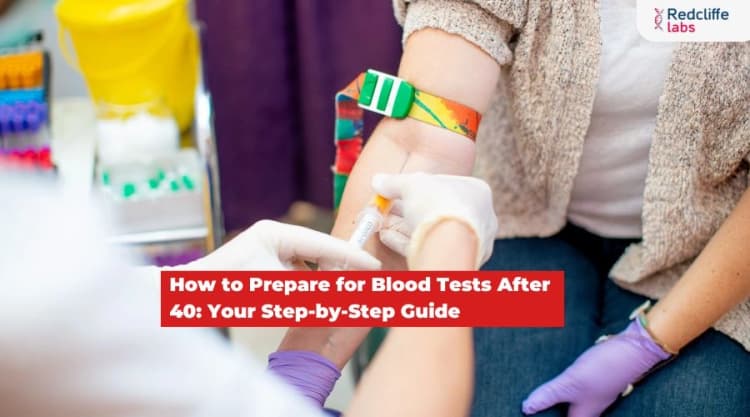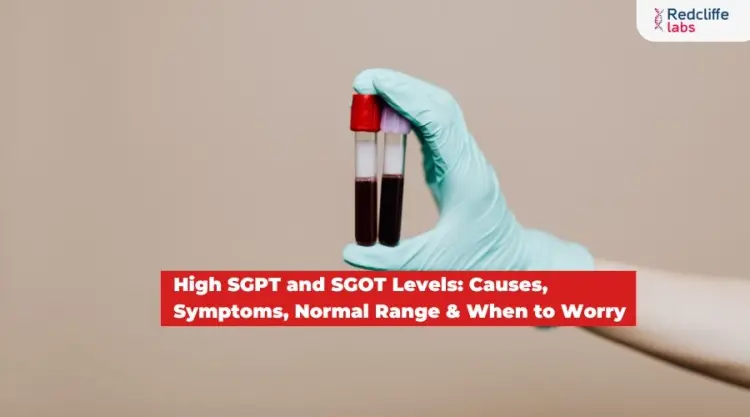The Total Immunoglobulin E (IgE) Test measures overa...Read more
Blood
Unlock special
discount on
this package
Login to Unlock 🔓
Also Known As
Immunoglobulin E (IgE) Total Antibody Test, Total IgE Test, Allergy Blood Test, IgE Serum Testtest Instructions
NABL Accredited lab*

Booking Benefits Unlocked Worth FREE 799

Report Consultation

Diet Plan
*Available once your report is generated.
At Redcliffe Labs, we have a single goal: to give India its right to quality diagnostics.
Customers served
Tests Processed Everyday
Cities
Collection Centres
World Class In-house Labs
Home Collection Experts
1 Test Parameters
Immunoglobulin E (IgE Total)
1 PARAMETER INCLUDED
1 PARAMETER INCLUDED
- S. IgE total
Top Booked Health Checkup Packages
Reports in 12 hours
|Parameters 94
Reports in 12 hours
|Parameters 96
Reports in 12 hours
|Parameters 89
Reports in 12 hours
|Parameters 96
Reports in 12 hours
|Parameters 90
Helps you know your test better
Q. What is the purpose of the IgE Total Test?
Q. What are the precautions required to take for an IgE Total Test?
Q. What is the Price of the IgE Total Test ?
Q. What is a suitable time to get this test done?
Verified by Medical Expert

WRITTEN BY
Sheena Mehta

MEDICALLY REVIEWED BY
Dr. Pradeep Lodha
Table of Content
Introduction to IgE Total Test
Do you often suffer from allergic reactions and cannot determine the cause? You may need to get your total IgE test done.
Immunoglobulin E or IgE is an antibody released by your immune system in the body’s defense. Substances you may be allergic to trigger the immune system to produce the required antibodies (IgE) to fight the foreign substances. Unfortunately, the antibodies trigger the release of histamine, which further turns into an allergic reaction.
This is why it is important to get the IgE levels tested. The higher the IgE level, the more severe the reaction. The test helps your doctors provide you with the required treatment or suggest further tests if necessary.
You can book an IgE test from Redcliffe Labs and collect your sample from your doorstep.
IGE Test Details:
| Also Known As | Immunoglobulin E (IgE) Total Antibody Test, Total IgE Test, Allergy Blood Test, IgE Serum Test |
| Purpose | Determine if you are suffering from any allergy or not |
| Preparation | Refrain from drinking alcohol or smoking before the test |
| Fasting | No Fasting Required |
| Get Reports Within | 15 Hours |
| Ige Test Cost | INR 699 |

What is the purpose of the Total IgE Test?
Everyone knows how important it is to get tested for allergies, and the total IgE test is the most reliable and accurate. Here are five reasons to make you understand better the purpose of the Total IgE Test:
- Detection of allergens:
It helps in the determination of allergens triggering the reaction and in further testing and treatment.
- Determine treatment methods:
It helps doctors with their treatment. It helps them determine if the person is suffering from any allergic reaction or other issues so that they can provide treatment accordingly.
- Screening other conditions:
If the test report does not show any sign of an allergic reaction, it clarifies the situation for the doctors, and they proceed with tests for other conditions.
- Determining inflammation:
This IgE serum test can help determine skin, lung, or other organ-related conditions.
- Progress monitoring:
It helps determine any progress that has happened due to the treatment.
These are the main reasons one should get tested for IgE on the doctor’s recommendation.
What do the IgE test measures?
IgE test measures the immunoglobulin E (IgE) antibodies in the blood. These antibodies are part of the immune system and are primarily involved in allergic responses.
The total IgE test measures the blood's quantity of immunoglobulin E (IgE), a type of antibody. Antibodies are proteins your immune system produces to help defend against potential threats.
When the body encounters an allergen, it produces IgE antibodies specific to that allergen. These IgE antibodies trigger the release of histamine and other chemicals that cause allergy symptoms.
Understanding the Symptoms of Allergies:
There are multiple types of allergies, each with different triggers; it is important to understand and know about the symptoms as they help you understand your triggers. Here are some of the most common symptoms that one can look out for:
- Sneezing
- Dizziness
- Eczema
- Difficulty in Breathing
- Swollen Eyes and Nose
- Rashes and Cracked Skin
Severe Allergies are known to cause a respiratory condition called anaphylaxis, and this condition can be very fatal. It is also important to understand the symptoms of the condition so you can act on it as soon as possible. Here are the symptoms of anaphylaxis one can look out for:
- Loss of consciousness
- Shortness of Breath
- Skin Rashes
- Major Pulse Drop
- Blood Pressure Drop
Understanding the symptoms of any condition helps one better understand the situation, and one can actively participate in finding a solution for it.

Preparations Before the Total IgE Test:
No special set of rules must be followed before taking the IgE blood test. However, these are some basic guidelines to be followed:
- You are not required to fast before taking the double marker test, but if your health requires it, talk to your physician about any special dietary requirements.
- If you are pregnant, you might be taking any medication or supplements. It is important to inform your doctor about that as well. You do not need to panic in such situations; if they think there is an issue, they will tell you about the solution as well.
- It is a blood test, so avoiding any workouts or yoga before taking the test is always recommended.
- It is advised not to smoke or drink alcohol before taking the test because it may alter the test results.
If you follow these basic guidelines before taking the test and keep your physician in the loop, you are ready.
The procedure for the Total IgE test:
This IgE serum test is like any other blood test, and it does not take more than 5-10 minutes for the phlebotomist to take the blood sample. The procedure for getting the test is as follows;
- The phlebotomist, on arrival, ties a band around your arm.
- They tell you to make a fist so the veins are properly visible.
- They disinfect the area from which the blood is to be drawn.
- Then, a thin, sterile needle is inserted into the vein to draw blood, and after the needle is removed, a bandage is put on the punctured area.
- After drawing the blood, they put it in a vial, seal it, and label it.
- This vial is then taken to the laboratory to be tested.
Remember that the punctured area may have a stinging sensation for two days. If the pain lasts longer than two days or is significantly severe, consult a doctor.
Interpreting the IgE Blood Test Results:
The normal IgE levels for adults can vary depending on the laboratory performing the test and the specific units of measurement used. The normal range of IgE levels ranges between 0 to 150 IU/ml.
Well, everyone has only one level of IgE. It may vary from person to person over time. At the same time, the normal range of IgE levels for adults falls within the range of 150 to 1000 IU/ml.
IgE levels above the normal range can suggest various health issues, such as asthma, hay fever, or eczema. In some cases, extremely high IgE levels can cause certain rare immunodeficiency disorders. So, if you notice any allergic symptoms, consult your doctor and take an IgE test.
How to Prevent Allergic Reactions?
Allergic reactions can be life-threatening; knowing about your allergies and trying to avoid them as much as possible is important. Some of the ways you can prevent allergic reactions are:
- Avoid Allergens:
- Food Allergies: Read food labels carefully, avoid cross-contamination, and be cautious when eating out.
- Environmental Allergies: Stay indoors during high pollen seasons, use air purifiers, and keep windows closed.
- Pet Allergies: Limit exposure to pets, keep pets out of certain rooms, and clean frequently.
- Medications:
Antihistamines: These can help control symptoms of mild allergies.
Epinephrine Auto-Injectors: Carrying an epinephrine auto-injector (e.g., EpiPen) is essential for severe allergies.
- Immunotherapy:
Allergy shots or sublingual tablets can gradually reduce sensitivity to certain allergens over time.
- Personal Hygiene:
Wash hands and face frequently, especially after being outdoors or in contact with potential allergens.
Shower and change clothes after outdoor activities to remove pollen and other allergens.
- Home Environment:
Use allergen-proof mattresses and pillow covers.
Regularly clean and vacuum to reduce dust mites, mold, and pet dander.
Maintain low indoor humidity to prevent mold growth.
- Educate and Communicate:
Inform family, friends, and coworkers about your allergies.
Wear a medical alert bracelet if you have severe allergies.
- Avoid Smoking and Pollutants:
Avoid exposure to tobacco smoke and other pollutants that can exacerbate respiratory allergies.
Implementing these measures can significantly reduce the risk of allergic reactions and help manage symptoms effectively.
Who is At Risk?
Certain conditions make someone more vulnerable to allergies; here are a few things that increase your risk of getting allergies:
- Having a family history of hives, eczema, hay fever, etc. then, you are prone to suffer from allergic reactions and even asthma.
- If you have been diagnosed with asthma or any form of allergy before.
- Children are vulnerable to allergens and need to be more careful around them.
So, if there are any symptoms of an allergic reaction, one should get an IgE Total Test. The test helps in either confirming the diagnosis of allergies or ruling out the possibility so that doctors can provide medication accordingly.
Is there any risk of IgE allergy tests?
There is no or minimal risk of IgE allergy test. However, like any medical procedure, some minimal risks are associated. These are-
- Pain or Discomfort
- Bruising
- Risk of bleeding
- Dizziness or Fainting
- Risk of Infection (Rare)
- False Positives/Negatives
Consult a healthcare provider if you experience severe or prolonged symptoms, such as swelling, redness, or pain at the puncture site.
When Should One Take The IgE Total Test?
The Total IgE test can be done when the person:
- If you experience allergy symptoms such as itchy or watery eyes, swelling, shortness of breath, skin rash, congestion, or sneezing.
- To track and monitor treatment progress and effectiveness
- If a parasitic infection or allergic respiratory disease is suspected.
- In individuals with a family history of allergies.
Treatment for Allergy Test (IgE)
The treatment plan will depend on the type of allergies and how serious your symptoms are-
Avoidance of Allergens
- The most effective way to manage allergies is to avoid exposure to identified allergens.
- Food Allergies: Avoid specific foods like nuts, shellfish, or dairy.
- Environmental Allergies: Reduce exposure to pollen, dust mites, mold, or pet dander by using air purifiers, cleaning regularly, and staying indoors during high pollen seasons.
The most effective treatment plans for allergies involve avoiding the allergens. Home remedies for mild allergies include-
- Acupuncture
- Butterbur
- Using an air filter or dehumidifier
- Nasal irrigation
- Vitamin D
- Stinging nettle tea
Prescription and over-the-counter (OTC) medications may help with allergy system, such as:
Medications
- Antihistamines: Block histamine release to reduce symptoms like sneezing, itching, and runny nose (e.g., cetirizine, loratadine).
- Decongestants: Relieve nasal congestion (e.g., pseudoephedrine, oxymetazoline).
- Corticosteroids:
- Nasal Sprays: Manage inflammation in the nasal passages (e.g., fluticasone, mometasone).
- Oral/Topical Steroids: For severe skin or systemic reactions.
- Leukotriene Receptor Antagonists: Used for asthma or allergic rhinitis (e.g., montelukast).
- Epinephrine Auto-Injectors: For emergency treatment of anaphylaxis (e.g., EpiPen).
When to Consult a Doctor
- If symptoms persist or worsen despite treatment.
- If you're considering immunotherapy or other long-term solutions.
IgE Test Price At Redcliffe Labs!
If you have frequent allergies, you must get the IgE serum test done. Your doctor may recommend the test for multiple reasons, so it is always advised to get the test done as soon as possible.
The IgE test price at Redcliffe Labs is INR 699. This price varies from lab to lab, but we at Redcliffe Labs try to keep it minimal. You can book your test from our website or download the Redcliffelabs app. You can get your test done from the comfort of your home and get the results online in a stipulated timeframe.

IGE Test Cost in Different Cities
| City Name | Discounted Price |
| Delhi | ₹699 |
| Noida | ₹699 |
| Mumbai | ₹699 |
| Bangalore | ₹699 |
| Kolkata | ₹699 |
| Pune | ₹699 |
| Lucknow | ₹699 |
| Ahmedabad | ₹699 |
| Hyderabad | ₹699 |
| Chennai | ₹699 |
| Gurgaon | ₹699 |
| Jaipur | ₹699 |
| Faridabad | ₹699 |
| Indore | ₹699 |
| Patna | ₹699 |
Note: We also offer IGE Test PAN India. Please call the number 8988988787 to check the availability of our services in your area.
5 Simple Steps to Manage Your Health with Redcliffe Labs
Quick, Simple & Convenient; trusted care delivered to your doorstep.

Start Your Online Booking
Open the Redcliffe Labs website/app. Select the test or package and enter your details. Schedule the service for your preferred slot.

Live Tracking
Stay updated with real-time tracking for a smooth and timely home sample collection.

Sample Collection
Our certified experts ensure a smooth, hygienic, and fully compliant sample collection experience.

Doctor-Verified Smart Reports
Every report is clinically checked by expert doctors and shared with smart, actionable insights.

Your Health Journey Continues Post Reports
Consult with our expert medical team to get actionable insights to improve your health.
Nearby Labs(9)
Redcliffe Labs Noida

MC-5280
Redcliffe Collection Center
Redcliffe Collection Center
Redcliffe Collection Center
Redcliffe Collection Center
Redcliffe Collection Center
Redcliffe Collection Center
Redcliffe Collection Center
Redcliffe Collection Center
Frequently Asked Questions
What is the IgE test?
What is the price of the total IgE test?
How to read IgE test results?
Why is the IgE test done?
Do IgE tests require fasting?
What does IgE test for?
When is the IgE test done?
What is the IgE test's normal range?
What happens if the IgE level is high?
What foods cause high IgE?
How can I reduce my IgE level?
Can I book a IgE Total Test near me?
Can I book a home collection for a IgE Total Test?
Health Articles & Blogs
My Health
Stay informed with our expert health articles and blogs. Explore comprehensive guides on diseases, nutrition, preventive care, and wellness tips to help you make better health decisions.
How to Prepare for Blood Tests After 40: Your Step-by-Step Guide

Why is PCOS Continuously Rising in Women?

10 Healthy Holi Recipes for Your Fitness Goals in 2026
Looking for healthy Holi recipes? Discover 10 festive dishes that support your fitness goals while keeping celebrations delicious.

Importance of Heart Health Before Pregnancy: Everything You Need to Know

Migraine Treatment at Home: Effective Ways to Relieve Migraines Naturally

High SGPT and SGOT Levels: Causes, Symptoms, Normal Range & When to Worry

Brain Hemorrhage Symptoms: Early Warning Signs, Types, Causes & When to Seek Emergency Care

What is SGPT in Blood Reports? Everything You Need to Know
Explore My Health
